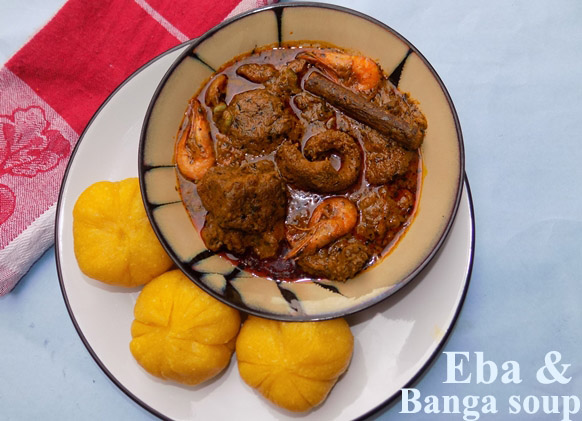Share
What is Eba (Garri) Made of?
Question
What is Eba (Garri) Made of? I am just learning to eat some of the popular Nigerian foods that I find the recipes on the web. I purchased some garri (eba) from an African shop nearby but just wondering what it is actually made of. Some say garri is made of cassava other say it can be made from yam, which one is it?
Answers ( 5 )
Eba is made from cassava…cassava is passed through many process to get EBA…it is made when cassava is grated, dried and fried(in an oven with hot fire)…when its fried it turns to garri and from garri you make it to EBA i.e missing hot water with d proceed cassava(garri)….so i strongly believe EBA is gotten from cassava
Garri, eba or loliloli as u may choose to call it is made from cassava. Here, cassava is harvested, pilled , washed and grounded and left to ferment for three to four days after which it’s fried mixed with palm oil. It is a meal for every one but the processing is only for the hardworking cause it’s quite tedious
Eba(garri) is made from cassava. Cassava is a plant grown in Nigeria. With the help of machines, it is processed to a powdery form. It is mostly eaten by indigenes occupying the South – south region of Nigeria. Although indigenes of south eastern Nigeria eat eba, but traditionally it’s not their native food. South eastern Nigerians eat pounded yam rather than eba.
Eba (garri) is a proceed from cassava. Cassava is a food plant grown in Nigeria. It is planted and grown for a minimum of one year, harvested thereafter, peeled, washed, grated and allowed to dry its water for two or three days. It is later fried and ready for consumption as Eba (garri).
Eba is made from cassava. Eba is actually a name for prepared garri. The picture below is garri.
I will not be going into the gory tale of how cassava is planted, the processes, the maturation period and the process involved in harvesting cassava.
But once cassava is harvested, it could be turned into starch, fufu or garri. Of course there are other things it could be made into but we will dwell on “swallows” for now.
If you intend making eba from cassava you should start by peeling the cassava.
Next, you wash and grind it. Then you transfer it into a bag to squeeze out excess fluid.
It is then fried and allowed to cool.
Cassava is what you make eba (garri) from.
Once you have garri, you can now make eba.
The process is simple, you boil hot water and add garri to it.


Finally, Eba can be served with anyone of the popular Nigerian soups. The image below is that of eba and banga soup. Banga soups is very popular in Niger Delta, Nigeria.